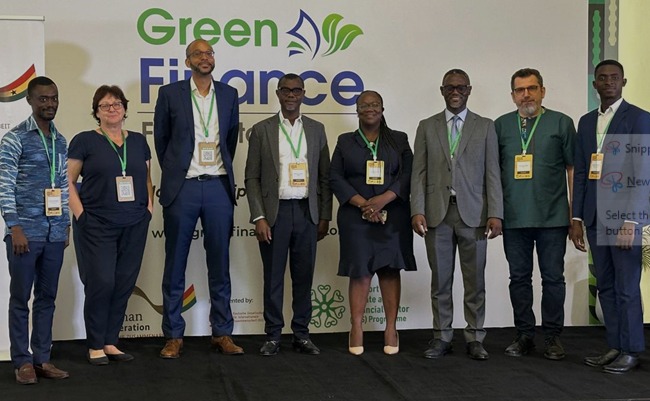With the aim of developing bankable green projects and promoting access to sustainable financing for businesses, the German Development Cooperation, through Deutsche Gesellschaft für Internationale Zusammenarbeit (GIZ) GmbH, has launched the Green Finance Facilitator (GFF) programme.
The launch event, held in Accra, was themed “Developing a Pipeline of Green Projects in Ghana.”
As Ghana advances towards transitioning to a sustainable, climate-resilient economy, achieving its climate goals requires substantial financial investment.
While $15 billion is needed, only 5% of this target has been secured, creating a significant gap between green finance providers who report a shortage of investable green business proposals, and Ghanaian businesses that often lack the capacity to present green projects meeting the requirements of financial institutions.
The GFF programme is designed to address this gap by building a pipeline of bankable and investable green projects.
The programme will support the increased scale and pace of green investments in Ghana by offering customized technical assistance and business advisory services through top-tier local partners.
Supported businesses will be presented to financiers for funding consideration.
William Hugo, Cluster Coordinator for the Network for Inclusive Development at GIZ-Ghana, emphasized the significance of this intervention:
“The Green Finance Facilitator (GFF) programme is a timely and relevant response to the urgent need for increased green finance flows to support sustainable and climate development in Ghana.
“With a focus on capacity building, technical assistance, and market development, we are proud to partner with our stakeholders to deliver the GFF program, which will help develop green projects that directly benefit the country.”
Key components of the GFF programme include financial feasibility review and financial modeling, business plan improvement and market analysis, structuring support to meet financier requirements and assistance with contractual negotiations.
During the event, the official launch of the GFF website was also announced. The website is designed to empower businesses and drive sustainable investments by offering a user-friendly interface with comprehensive resources.
These resources include detailed eligibility criteria, step-by-step application guidelines, and downloadable tools to support green projects.
Call for Applications
Small and medium enterprises (SMEs) as well as large projects are encouraged to apply for support under the GFF programme.
Interested applicants can access eligibility criteria and application guidelines on the GFF website at www.greenfinancefacilitator.com.
Successful applicants will be matched with top-tier local business advisory firms who will provide tailored support specific to each business or project’s needs.
The GFF will then invite financial institutions to consider financing offers and assist cohort companies in negotiating and securing these offers.
The GFF programme represents a vital step in advancing Ghana’s climate goals and fostering sustainable economic growth through green investments.
About GIZ
As a provider of international cooperation services for sustainable development and international education work, GIZ is dedicated to building a future worth living around the world.
GIZ has over 50 years of experience in a wide variety of areas, including economic development and employment, energy and the environment, and peace and security.
We work with businesses, civil society actors, and research institutions, fostering successful interaction between development policy and other policy fields and areas of activity.
The German Federal Ministry for Economic Cooperation and Development (BMZ) is our main commissioning party.
Currently, GIZ promotes sustainable development in Ghana via about 50 programmes and projects.
Our activities currently cover three priority areas: Energy and Climate, with a concentration on renewable energy and energy efficiency; Training and Sustainable Growth for Decent Jobs, and Peaceful and Inclusive Societies, which looks at good governance.

